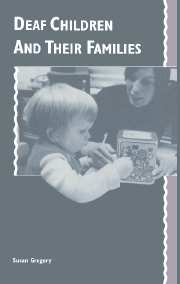Book contents
- Frontmatter
- Contents
- Foreword
- Preface to the 1995 edition
- Acknowledgements
- 1 The Handicap of Deafness
- 2 The Deaf Child at Play
- 3 Day-to-Day Living
- 4 Discipline and Punishment
- 5 Learning to Communicate: Equipment
- 6 Learning to Communicate: Education
- 7 Coming to Terms with Deafness
- 8 Family Life with a Deaf Child
- 9 The Family and the Community
- 10 Overview
- Appendix I The Interview Schedule
- Appendix II The Interview Situation: Advantages and Disadvantages
- Appendix III The Sample
- Bibliography
- Index
1 - The Handicap of Deafness
Published online by Cambridge University Press: 24 November 2009
- Frontmatter
- Contents
- Foreword
- Preface to the 1995 edition
- Acknowledgements
- 1 The Handicap of Deafness
- 2 The Deaf Child at Play
- 3 Day-to-Day Living
- 4 Discipline and Punishment
- 5 Learning to Communicate: Equipment
- 6 Learning to Communicate: Education
- 7 Coming to Terms with Deafness
- 8 Family Life with a Deaf Child
- 9 The Family and the Community
- 10 Overview
- Appendix I The Interview Schedule
- Appendix II The Interview Situation: Advantages and Disadvantages
- Appendix III The Sample
- Bibliography
- Index
Summary
Without knowing a deaf child it is very difficult to comprehend what it is like to have one in the family. The deaf child looks normal, and yet his handicap is very real. For those people who have never encountered a young deaf child it is hard to understand how much difference it can make. One might think of what a person misses who cannot hear music, or church bells, or the birds sing. One might think of some of the practical problems of having a small deaf child, that he does not hear cars coming, a horn hooting; that one cannot call out to warn of danger and so one has to keep him close. But it is not these things that constitute the real problem. Life is impoverished without the joy that various sounds can bring, and there are situations which can be dangerous for someone who cannot hear; but there are greater problems than these. It is learning to understand other people, and to talk to them, that is the real area of difficulty.
A normal hearing child learns to talk because he is constantly being talked to. He comes to realise that the sounds made by the human voice are of special significance. How difficult it is, though, for the child who cannot hear the human voice, or who can only hear one or two sounds. Without special teaching he will not learn to understand other people, or to talk himself. Even with special teaching, one can never provide the vast experience the hearing child has of spoken communication.
- Type
- Chapter
- Information
- Deaf Children and their Families , pp. 1 - 19Publisher: Cambridge University PressPrint publication year: 1995



